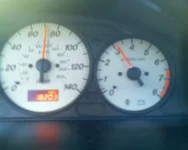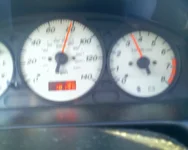Hi,
How is everyone? I have been enjoying my 2003 Protege5 since I bought it. It only has about 18000 original miles on it. Automatic. My question is gas mileage. I thought I would be getting over 30 mpgs with this. Not the case, I am averaging about 25 mpgs.
I drive 90% highway and drive a consistent 75-80m. 27 miles to work then 27back. Just wondering what you guys are getting for mpgs.
Also wondering about my rpm ranges. Car seems to really rev from sixty up. I added a couple of pics showing my rpms just over 3000 for 70 mph and about 3400-3500 for 80 mph. I used cruise control and was on flat highway when I took the photos.
Just a touch of the peddle or a slight incline automatically adds 2-300 more rpms.
I really am not use to an automatic tranny, this is my first one in years. Last being a '69 Camaro, my first foreign. So I have no experience with their performance.
Is this consistent with the other automatics out there????
Thanks for any input,
JJBroc
How is everyone? I have been enjoying my 2003 Protege5 since I bought it. It only has about 18000 original miles on it. Automatic. My question is gas mileage. I thought I would be getting over 30 mpgs with this. Not the case, I am averaging about 25 mpgs.
I drive 90% highway and drive a consistent 75-80m. 27 miles to work then 27back. Just wondering what you guys are getting for mpgs.
Also wondering about my rpm ranges. Car seems to really rev from sixty up. I added a couple of pics showing my rpms just over 3000 for 70 mph and about 3400-3500 for 80 mph. I used cruise control and was on flat highway when I took the photos.
Just a touch of the peddle or a slight incline automatically adds 2-300 more rpms.
I really am not use to an automatic tranny, this is my first one in years. Last being a '69 Camaro, my first foreign. So I have no experience with their performance.
Is this consistent with the other automatics out there????
Thanks for any input,
JJBroc


